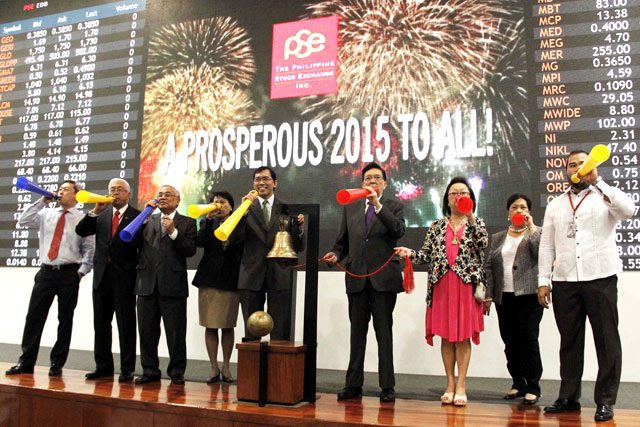SUMMARY
This is AI generated summarization, which may have errors. For context, always refer to the full article.

I love stocks.
I believe it is one of the greatest equalizers for Filipinos to participate in our ever growing economy without shelling out millions – that as our economy grows, the more chances we all have as investors to earn and maximize its growth.
As of the last trading day of 2014, the Philippine Stock Exchange Index (PSEi) closed up 23%.
This means that if you invested in end-2013 in First Metro Philippine Equity Exchange Traded Fund (an exchange traded fund that tracks the performance of the PSEI) and held it until end-2014, your investment would have grown by 23%. That beats any savings accounts and time deposits out in the market. (READ: The top 10 stocks in the PSEi for 2014)
Pros and cons
For 2015, on a broad level, I believe our country’s fundamentals remain intact and we are still poised to grow not only now but for years to come.
Interest rates are still currently at low levels, a low interest rate environment is good for stocks as this entices investors and funds to look for yields that are higher than fixed rate investments. There is a lot of liquidity in the market; more money moving around is good and healthy for stocks.
A great economy creates a great stock market. Because of this, we are now entering the 6th year of our bull market. As good as it may sound, this means that stock prices are relatively higher than where it was a couple of years back.
Also, in spite of having great fundamentals at its current levels, the PSEI in general is more expensive compared to other countries. We have to consider that investors are in the market to make money; that as markets move higher, more investors who came in earlier are just looking for a time to unload and take profits.
Also as markets become more expensive, this would lead investors who still have cash to become more cautious of coming in, as they may want to wait for stocks to drop and become cheaper. Lesser buyers mean more sellers, and more sellers mean prices of stocks will go down.
The amazing thing about the stock market is no one has a crystal ball to predict where the market will go on a consistent basis and no one can tell where it will go day in and day out. Even the best stock market experts, from Warren Buffet, Peter Lynch, to George Soros, had their own share of mistakes in investing.
Go for consumer stocks
Despite this, we should not be scared of the risk but rather find ways to manage the risk by studying more.
Our goal as traders and investors is not to predict how prices will go but rather to see where the money is going in the economy. If the industry or sector continues to grow, profits will come in, and when profits come in, stock prices always chase the prospects of companies producing great earnings.
Until something shifts, I believe the Philippines is still, and will be, a consumption-driven economy.
More overseas Filipino workers (OFWs) remittances, and jobs created by the business process outsourcing (BPO) industry will bring in more cash for Filipinos. Thus, more Filipinos will be spending and upgrading their lifestyle, buying things they both need or want. Companies catering to this industry will continue to earn more.
What does that mean for us as investors? We can take a cue from that and align our investments in stocks that are connected to consumption.
Here are some companies related that are in the thick of our consumption-driven economy:
- CIC – Concepcion Industrial Corp (air-conditioners and refrigerators)
- SSI – Store Specialists Inc (high-end and branded products)
- MAXS – Max’s Group Inc (largest casual dining chain in the Philippines)
- RRHI – Robinsons Retail Holdings Inc (supermarkets, department stores, convenience and drug stores)
- CNPF – Century Pacific Food Inc (Century and Blue Bay Tuna, Swift, Argentina, 555, among other brands)
Also, there are stocks that are all consumption related but are relatively more expensive via their price to earnings ratios. They are all great companies but it would be prudent to wait until they have become relatively cheaper than where they are right now:
- JFC – Jollibee Foods Corporation (largest quick service restaurant in the Philippines)
- DNL – D&L Industries Inc (one of the largest manufacturers of food ingredients, colorants, and additives in the country)
- URC – Universal Robina Corporation (manufactures branded consumer foods from Cloud 9, Nips, Nova, C2, Magic, X0, Great Taste, among others)
- PGOLD – Puregold Price Club Inc (one of the largest supermarket and hypermarket operators in the Philippines)
You may also add SMPH to the mix, as SM Prime Holdings still earns majority of its income from rental income from the malls it operates.
When to buy
For those who are a bit more conservative but still want to start buying stocks given that the market is relatively higher, you may want to consider looking at low beta stocks that give out a good dividend yield.
A beta of less than 1 means that the stock is less volatile than the market as a whole. This means that should the market correct and drop, stocks with low beta would not be as volatile headed down.
Also buying stocks which give good dividends would somehow still give you expected returns should the stock correct for the year.
Here are the stocks with low beta but have relatively higher dividends*:
- TEL – Philippine Long Distance Company (Dividend yield: 4.51%)
- GLO – Globe Telecom Inc (Dividend yield: 4.34%)
- MWC – Manila Water Company (Dividend Yield: 3.44%)
I hope that these insights help serve as a reference point in your investments.
My desire is that you study these stocks further, make your own strategy, and gain the conviction on where you will be putting your money.
The best place to earn in the market is when you are fully convinced in what you are buying, and you do not listen to rumors but derive something based on your own study and research.
May you have a great and profitable 2015 ahead! – Rappler.com
*Disclaimer:
As of December 31, 2014 Marvin Germo is a registered financial planner, an author, personal finance consultant, and a stock market trader and investor. He has around 7 years of experience in the Philippine financial industry. He specializes in technical analysis and position trading. Read his blog. Follow him on Twitter: @marvingermo
Marvin Germo is a registered financial planner, an author, personal finance consultant, and a stock market trader and investor. He has around 7 years of experience in the Philippine financial industry. He specializes in technical analysis and position trading. Read his blog. Follow him on Twitter: @marvingermo
Add a comment
How does this make you feel?
There are no comments yet. Add your comment to start the conversation.